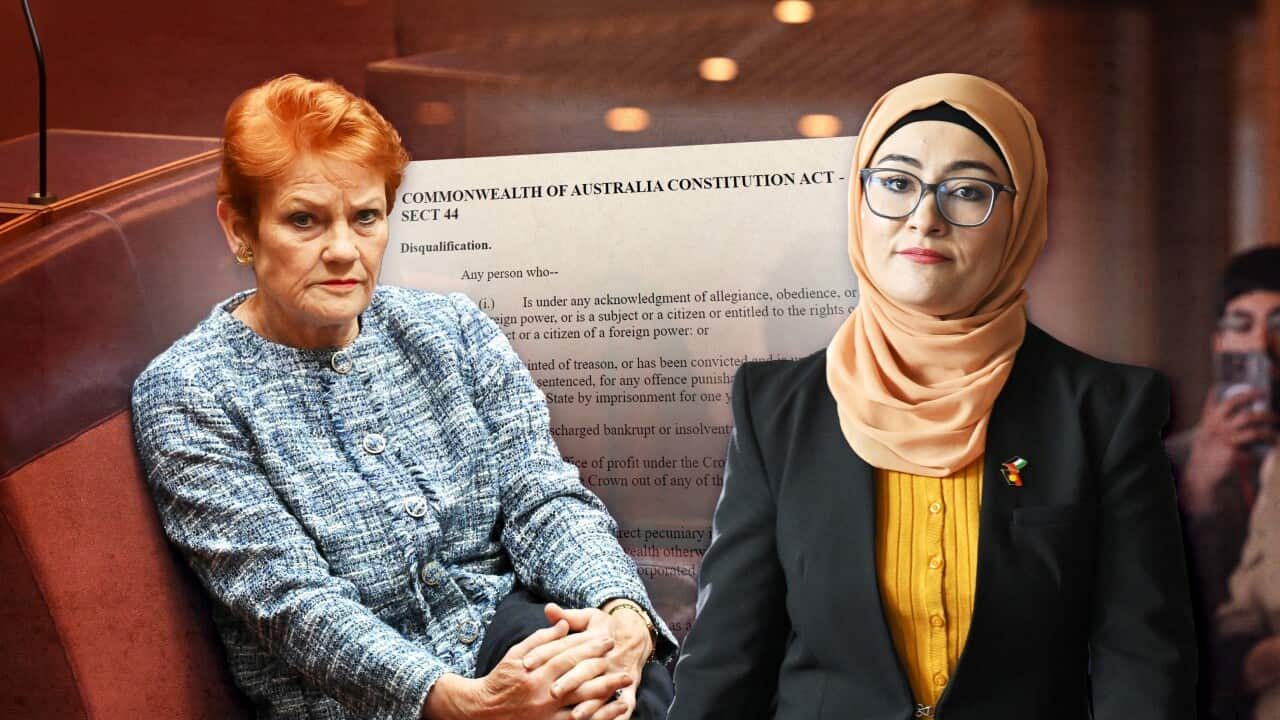Pauline Hanson has sought to put a section of the Australian constitution that once sparked a parliamentary eligibility crisis in the spotlight.
On the same day, senator Fatima Payman after , the One Nation leader wrote to Prime Minister Anthony Albanese requesting he consider an "urgent matter" regarding Payman's eligibility to sit in parliament.
Her concern? Whether Afghan-born Payman falls foul of , which says foreign citizens and dual-citizens can't sit in parliament.
"With senator Payman's recent announcement about forming a new political party, likely utilising her position as a senator to form a parliamentary political party, it's imperative that we address her status swiftly ahead of the upcoming federal election," Hanson wrote on X on Wednesday alongside a copy of her letter to Albanese.
"I have called for a transparent process to examine her situation, suggesting a bipartisan approach to resolve these constitutional concerns."
But as one constitutional law expert points out, the Western Australia senator's eligibility is unlikely to be questionable, and she has taken steps to ensure it is not in doubt.
Fatima Payman's Afghan citizenship renunciation conundrum
Payman in 2003 under her mother's refugee visa, and two years later, she was granted Australian citizenship.
Before the 2022 federal election, Payman's eligibility was also questioned because of her citizenship status.
She said that she had approached the Afghanistan embassy in Australia in 2021 to renounce her citizenship, and her request was not finalised because the embassy had no contact with the Taliban government that got into power in the same year after .
Because she had taken "all reasonable steps" to renounce her Afghan citizenship, a requirement under a 1992 High Court ruling regarding section 44, Payman was allowed to contest the election and won her place in the Senate.
How does Payman's case differ from those in the eligibility crisis?
"Section 44 of the constitution prohibits dual citizens from sitting in parliament. As a general rule, a would-be parliamentarian must get rid of any foreign citizenship they hold before nominating," Luke Beck, professor of constitutional law at Monash University, told SBS News.
"This can cause problems if the politician does not know they hold foreign citizenship, as we saw with Barnaby Joyce and others some years ago."
whose .
In August 2017, Joyce was confirmed to be a dual citizen of New Zealand, and three months later, the High Court of Australia ruled that he was ineligible to be a candidate for the House of Representatives.
In the same year, eight senators and seven MPs resigned or were ruled ineligible by the High Court.
The senators from the 2016 election were all replaced by candidates from the same tickets. Additionally, six members of the House of Representatives renounced their non-Australian citizenship, re-contested in by-elections, and won.
Hanson said Payman should be "afforded every opportunity to refer herself to the High Court to clarify her eligibility".
"If she chooses not to take this step, it then falls to the Senate to make that referral," Hanson said.
Beck said that referral would not be straightforward.
"If a country doesn't allow citizenship renunciation or if it would be practically impossible to renounce, then it is enough for the would-be parliamentarians to take reasonable steps to renounce their foreign citizenship," Beck said.
"Getting senator Payman's situation to court at this stage in the parliamentary cycle would require a motion by the Senate."

Payman was eight when she came to Australia from Afghanistan in 2003 under her mother's refugee visa, and two years later, she was granted Australian citizenship. Source: AAP / Mick Tsikas
"She has to persuade the Senate to pass a motion referring a case to court, to prove that Payman holds foreign citizenship," he said.
"And then prove either that Payman could have but did not renounce that foreign citizenship, or that while Payman could not have renounced that foreign citizenship she didn't even take reasonable steps to try."
Beck said if the Senate passed a motion, the High Court would then decide whether it was practically impossible for Payman to renounce her citizenship.
"But there would need to be a case first," he said.
"At this stage in the parliamentary cycle, there could only be a case if the Senate passes a motion referring one to court. If Payman runs again after her term expires (in 2028), then there's a short period in which members of the public could challenge," Beck said.
Beck said the other politicians have not had to prove in court that they aren't dual citizens and question why anyone would "want to treat Payman differently".
SBS News has contacted Payman and Albanese's offices for comment.











